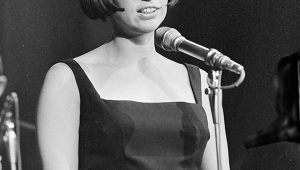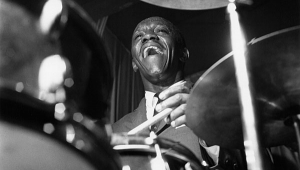| Columns Retired Columns & Blogs |
Frank Zappa on CD (and LP), Part I-III Page 2
Uncle Meat:
The obscure and little-bought Lumpy Gravy aside, 1968's 2-LP Uncle Meat, "most of the music from the Mothers' movie of the same name which we haven't got enough money to finish yet," was Zappa's first major musical statement. The complexity and density of this music, even almost 20 years later, is staggering, and all the more remarkable when one realizes that, at the time of recording, at least half of Zappa's musicians could not read a note of music. They learned these thorny, post-Vienna-School scores entirely by rote. For those who have yet to hear Uncle Meat, this will be hard to believe.
The obscure and little-bought Lumpy Gravy aside, 1968's 2-LP Uncle Meat, "most of the music from the Mothers' movie of the same name which we haven't got enough money to finish yet," was Zappa's first major musical statement. The complexity and density of this music, even almost 20 years later, is staggering, and all the more remarkable when one realizes that, at the time of recording, at least half of Zappa's musicians could not read a note of music. They learned these thorny, post-Vienna-School scores entirely by rote. For those who have yet to hear Uncle Meat, this will be hard to believe.
The music itself beggars description, being a combination of electronically transmogrified reeds, percussions standard and exotic, Varesian musique concrete, '50s doo-wop, Balinese gamelan, Ornette Coleman-style free blowing, big band, and straight-ahead rock, jazz, and fusion. Those familiar with the music may be surprised to learn that no synthesizers were used---the many strange sounds were all achieved by electronically altering the sounds of standard instruments. There are a handful of brief songs, but, as Zappa says in the liner notes, "The words to the songs on this album were scientifically prepared from a random series of syllables, dreams, neuroses & private jokes that nobody except the members of the band ever laugh at. They are all very serious & loaded with secret underground candy-rock psychedelic profundities. (Basically this is an instrumental album.)" Suffice it to say that, of the 50 or 60 Zappa discs released, Uncle Meat remains my favorite.
Throughout my notes for Part II of this survey, one word reappears several times on each page: "clarity." This is nowhere more appreciated than on Uncle Meat. Zappa's first album on his own Bizarre label (distributed by WEA), Meat had quite good sound for the time; my first-edition set has withstood scores of playings over the last 20 years, and still sounds fine. But, quiet as the board at Apostolic Studios may have been, there are only so many tracks one can build into an analog master tape before hiss starts to take over; and there are often over 40 tracks at a time here.
The CD improves all of this subtly and remarkably. The bass and organ parts are clean and clear throughout; saxist Ian Underwood's stage-prowling on the live "Ian Underwood Whips It Out" is much more audible than on LP; "Mr. Green Genes" includes an alto sax descant that I've only heard hints of before; the complex "Project X" is revealed in its full glory as the precursor to last year's "While You Were Art II" (Jazz From Hell); the vocals on "Cruising for Burgers" and "Electric Aunt Jemima" are velvet-smooth; the rhythm and reed overdubs on the six "King Kong" variations are now in perfect proportion to the basic rock-band track, and Zappa's acoustic guitar overdubs in the same section are fully audible. The editing, such a problem in the digital remix of We're Only In It For The Money, is flawless here, at least as tight as on the LP, and sometimes better: witness the segues over the former LP side breaks.
The total time of the original LP, 70:35, could have easily fit on a single CD. However, Zappa has seen fit to include 50:14 worth of audio excerpts from the finally completed Uncle Meat film (available on videocassette from Honker Home Video). These excerpts seem to be the soundtrack of a documentary film about the making of a film whose primary subject is itself. Pretty self-referential. Even a hard-core fan such as myself found the going tough and unrewarding. Endless repetitions of the phrase "I'm using the chicken to measure it," and equally endless takes and between-takes blather about showering with a hamburger-wielding monster add up to considerably less than the sum of their parts.
And the inclusion of the previously unreleased, 3:46 "Tengo Na Minchia Tanta," a musical nothing with heavy breathing, adds little class to the proceedings. But here as elsewhere, Zappa attempts to have his ironic cake and eat it too: I'm sure he would jeer just as loudly if this stuff was taken seriously as he would if it was rejected as swill. Zappa has always had that contemptuous edge, periodically releasing garbage like Thing-Fish, which spends much of its energy calling attention to its own worthlessness, then deriding his audience for agreeing or disagreeing with such a self-assessment. "Cheesy" is a term Zappa has used ever since 200 Motels to describe his own movie sets, music, and general aesthetic sensibility; he can hardly blame us if, from time to time, we agree.
In short, the original configuration of Uncle Meat is very well served here; considering that the entirety of that original release could have fit on a single CD, however, this double package (which I've seen retailing for $34) is not a good deal.
Hot Rats:
The only early Zappa LP that many serious musicians ever owned, 1969's Hot Rats is straight-ahead fusion that, at the time, set some new standards for arrangement, production, and sound quality. Zappa the revisionist reappears here, but, unlike his (mis)handling of Ruben, seems bent on fulfilling rather than rethinking his original intentions.
In that spirit, this collection of big-band heads framing long instrumental solos by Zappa, keyboardist/saxist Ian Underwood, and violinists Sugarcane Harris and Jean-Luc Ponty, is, for the most part, expanded and spiffed up. Throughout the entire album, Underwood's piano is mixed in several times louder than on the LP. This is good news: his comping on "Son of Mr. Green Genes" deserves to be heard, and his rhythmic interjections on "It Must Be A Camel" are welcome in the stronger voicing. On "Little Umbrellas," however, the piano is so much louder than on LP that it entirely changes the tune's proportions (though not for the worse).
"The Gumbo Variations," at 12:58 the longest cut on the LP, is here expanded to what I assume is its full, uncut, 16:57 length. The change is all for the better: Underwood's previously heavily edited tenor sax solo makes a great deal more formal and dramatic sense unedited. And, throughout the tune, previously deleted bars, choruses, and little snippets here and there are reinstated to make the whole a much more satisfying and organic experience. Not surprisingly, Sugarcane Harris's dramatic, bluesy solo had been uncut on the LP; he sounds great here as well. "Willie the Pimp" is also slightly rearranged, with extra bars of riffing inserted between the verses of Captain Beefheart's demented vocal. Too, Ponty's violin is brought far to the fore during the chorus.
The justly famous "Peaches En Regalia" sounds quite different here: the familiar wall of sound is gone, replaced by a fuller, richer specificity of voicings. This is great, but, after the bridge, Underwood's dramatic organus maximus pedal-point---one of my favorite parts of this recording---is simply gone. In its place is what sounds like the previous two bars edited in as a repeat. Why?
The LP's rich, thick sound was always a bit muffled and flattened. Not so here; there is great freshness and---again---clarity, the large choirs of reeds that appear throughout now much more audible as collections of individual instruments, however often overdubbed. And no digital harshness, either. Highly recommended. (By the way: Ryko has chosen "Peaches En Regalia," along with two other Zappa tunes, as the program of the very first pop 3" CD, or "subcompact" disc.)
Joe's Garage:
At the other extreme, the differences between the Zappa Records LPs and the Rykodisc reissue of Joe's Garage are quite subtle. There is no difference in program here at all. Stan Ricker's disc mastering for these releases on the short-lived Zappa label (distributed by PolyGram) was, well, masterful. The only difference between CD and LP that I could detect was slightly more presence---and I do mean slight---in Ike Willis's lead vocals, and then only in Act I. Zappa has complained about the unfortunate loss of bass due to the half-speed mastering here employed, but I have no complaints.
For the record, Joe's Garage is an extended (3 LP/2 CD) suite of songs and situations about a not-too-distant future America in which music is outlawed (as it already is, as Zappa cogently points out in the liner notes, in Iran). Unfortunately, other than three remarkable guitar solos, and much like Thing-Fish, there is precious little music here. The title song, "Catholic Girls," "Dong Work for Yuda," and "Lucille" are interesting, the riff-rocking facile enough, the vocals stunning, the arrangements angular and surprising, but much of it is rather disposable.
Except for those guitar solos. At an average of ten minutes apiece, there is one each of slow, medium, and fast tempi, each highlighting a different facet of Zappa's impressive guitar mastery. "Packard Goose" is modal metal machine music at frenetic pace, while "He Used To Cut The Grass" is ruminative, lonely, like the distress signals of a lost alien spacecraft. The pinnacle of the album, however, is "Watermelon In Easter Hay." This languid elegy, main character Joe's last imaginary guitar solo, is fitting requiem to any garage guitarist who ever slammed a whammy bar, and a side of Zappa---the heartfelt, soulful, vulnerable side---rarely shown in public.
For those guitarists who consider Shut Up 'N Play Yer Guitar an important part of their reference libraries, the final third of Joe's Garage is a must-have. The CD, however, offers very little more than the Zappa Records or Barking Pumpkin sets.
The Perfect Stranger:
In 1983, Pierre Boulez commissioned from Zappa a piece for his 29-member Ensemble InterContemporain. The result, "The Perfect Stranger," and two other pieces for chamber orchestra, are included on this release, along with four Zappa compositions for the Barking Pumpkin Digital Gratification Consort, otherwise known as Frank Zappa and His Synclavier.
- Log in or register to post comments



































